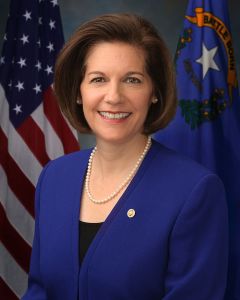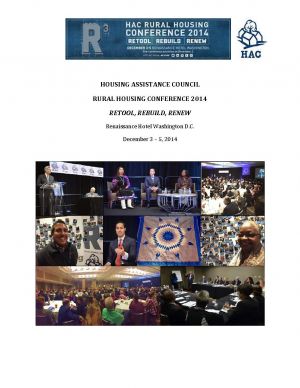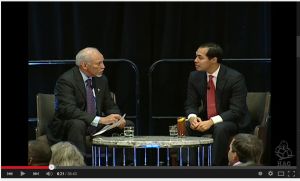HAC News Formats. pdf
December 14, 2018
Vol. 47, No. 25
2018 HAC Rural Housing Conference educates, inspires, and advances the rural housing community. • Federal Reserve Board of Governors chairman Jerome Powell addresses HAC conference • HAC awards recognize national, local and federal leadership for rural housing • USDA and HUD spending now expiring December 21 • Congress passes Farm Bill • Increased staff specialization planned for USDA Rural Development • Mark Calabria named to lead Federal Housing Finance Agency • Kathy Kraninger becomes head of Consumer Financial Protection Bureau • Perdue announces RD initiative for broadband and e-connectivity • Executive Order encourages development in Opportunity Zones • HAC’s Rural Voices magazine covers capacity building • Census Bureau releases new data for counties, towns, Native lands and more • Study examines trust lands and manufactured homes in Indian Country
HAC News Formats. pdf
December 14, 2018
Vol. 47, No. 25
2018 HAC Rural Housing Conference educates, inspires, and advances the rural housing community.
Over 600 registrants from 48 states heard from Federal Reserve Chairman Jerome Powell (see item below), Sen. Catherine Cortez Masto (D-NV), HUD Secretary Ben Carson, Rusty Smith from Rural Studio , HAC CEO David Lipsetz, former HAC Executive Director Moises Loza and former Deputy Director Joe Belden, as well as USDA and HUD staff and dozens of other experts. Materials from conference sessions are available through the conference app . Check out photos, comments and daily wrap-up videos on HAC’s social media: Twitter , Facebook , and YouTube . Watch HAC’s website and the HAC News for announcements as additional items, including videos of plenary sessions, become available.
Federal Reserve Board of Governors chairman Jerome Powell addresses HAC conference.
Speaking at the HAC Rural Housing Conference on December 6, Chairman Powell discussed the strength of the economy while acknowledging that not everyone has enjoyed the benefits of the strong economy equally. He stressed the importance of the Community Reinvestment Act and praised HAC’s research on the subject as beneficial to the Fed’s plans around potential CRA reform. His remarks garnered press coverage from the New York Times and Reuters.
HAC awards recognize national, local and federal leadership for rural housing.
At the 2018 HAC Rural Housing Conference, the Cochran/Collings Award for Distinguished Service in Housing for the Rural Poor went to Starry Krueger, President of the Rural Development Leadership Network. Four local leaders received the Skip Jason Community Service Award: Salvador Estrada (Tierra del Sol, NM), Cassie Hicks (University of Southern Mississippi Institute for Disability Studies, MS), Dennis Lalor (South County Housing, CA) (posthumous) and Joe Myer (NCALL Research, DE). Rep. Maxine Waters (D-CA) received the Henry B. González Award for an elected official.
USDA and HUD spending now expiring December 21.
The deadline for negotiations on FY19 appropriations was extended to December 21 because congressional activity was slowed by the death of former President George H.W. Bush on November 30. Various end results, including a government shutdown, are still possible.
Congress passes Farm Bill.
House and Senate conferees reached an agreement on a new five-year Farm Bill, dropping provisions that would have imposed stricter work requirements on food stamp recipients. The Senate passed it on December 11 and the House on December 12. President Trump is expected to sign it into law. The bill requires USDA to have an Under Secretary for Rural Development and requires the appointee be confirmed by the Senate. The Under Secretary position had been eliminated in a 2017 reorganization, replaced by an Assistant to the Secretary for Rural Development. Anne Hazlett has served in that role since June 2017. The bill also maintains local eligibility for USDA rural housing programs after the 2020 Census, so long as a place’s population does not exceed 35,000 and it remains “rural in character.” The bill authorizes a new Rural Innovation Stronger Economy (RISE) grant program, a concept HAC supported, to create rural job accelerators and related programming. HAC and others suggested additional improvements to the bill’s Rural Development title, but in general the 2018 RD title is much like the 2014 version.
Increased staff specialization planned for USDA Rural Development.
At the 2018 HAC Rural Housing Conference, RD officials explained some staffing changes, which are also described in letters from Secretary of Agriculture Sonny Perdue to members of the House and Senate Agriculture Appropriations Subcommittees. An October 10 letter says that applications for the Section 538 rental guarantee program and Section 515 rental loan program will no longer be processed or underwritten in each state office. Twenty-five staff, who will remain in their current state office locations, will work exclusively on either 538 or 515. According to a November 30 letter, instead of handling the Section 502 guaranteed program in each of the 47 state offices, the agency will create a single unit, so the program will be delivered by 275 employees rather than 300. In addition, appraisers, architects, engineers, and others will be “realigned” into the RD Business Center. The November letter says that affected staff will remain in their current locations and implies that unneeded staff will be reassigned rather than laid off. The November letter enumerates other changes being made in the RUS, RBS, and Community Facilities staffs, and additional changes are described in the HAC News, 11/30/18.
Mark Calabria named to lead Federal Housing Finance Agency.
President Trump will nominate Calabria, currently chief economist for Vice President Mike Pence, to serve a five-year term as director of FHFA, which regulates Fannie Mae, Freddie Mac, and the Federal Home Loan Bank system. The term of Melvin Watt, the current director, ends in January. FHFA director nominees must be confirmed by the Senate.
Kathy Kraninger becomes head of Consumer Financial Protection Bureau.
Kraninger, most recently an associate director at the Office of Management and Budget, was confirmed by the Senate on December 6 and sworn in on December 10. She takes over from Mick Mulvaney, head of OMB, who has been CFPB’s acting director.
Perdue announces RD initiative for broadband and e-connectivity.
On December 13 Secretary of Agriculture Sonny Perdue announced a new ReConnect Program to provide broadband infrastructure in rural areas with populations under 20,000. State and local governments, tribes, nonprofits, for-profits, limited liability companies, and coops are eligible for funding. Applications for grants are due April 29, for loan and grant combinations May 29, and for low-interest loans June 28. For more information, contact Chad Parker, RUS, 202-720-9555.
Executive Order encourages development in Opportunity Zones.
On December 12, President Trump signed an order creating a White House Opportunity and Revitalization Council, to be comprised of 13 federal agencies and chaired by HUD Secretary Ben Carson. The council is charged with targeting existing federal programs to “urban and economically distressed areas,” including Opportunity Zones, and to engage with all levels of government on revitalizing low-income communities. A list and map of all Opportunity Zones are available on the CDFI Fund’s website. A supportive statement issued by Anne Hazlett, USDA Assistant to the Secretary for Rural Development, says “USDA Rural Development programs will award priority points on applications from private sector intermediaries for projects built in opportunity zone census tracts as well as in other select programs for projects that directly benefit communities located in Opportunity Zones.”
HAC’s Rural Voices magazine covers capacity building.
The conference issue of Rural Voicesdescribes what it means to build the capacity of rural housing organizations, why it is important, who does it, how it is done and how it is financed.
Census Bureau releases new data for counties, towns, Native lands and more.
The newest American Community Survey data has been released on the Census Bureau’s American Fact Finder website. This five-year data provides estimates of demographic characteristics, income, housing, education and other subjects for states, counties, and smaller areas such as zip codes, census tracts, and American Indian Areas/Alaska Native Areas/Hawaiian Home Lands. For the first time, broadband-related data is included.
Study examines trust lands and manufactured homes in Indian Country.
The Center for Indian Country Development at the Federal Reserve Bank of Minneapolis has released new research, reported in a blog post titled “Race, Location, and Manufactured-Home Loans on American Indian Reservations.” They examine the statistically higher rate of loan applications at the intersection of manufactured housing, American Indian identity, and reservation trust land. Much of this research was shared at the 2018 HAC Rural Housing Conference session “Homeownership in Indian Country – Creating the Opportunity for Choice.”
Happy holidays from HAC!
The board and staff of the Housing Assistance Council wish peace, prosperity and affordable housing to all! HAC’s offices will be closed from December 24 to January 1.
Need capital for your affordable housing project?
HAC’s loan funds provide low interest rate loans to support single- and multifamily affordable housing projects for low-income rural residents throughout the U.S. and territories. Capital is available for all types of affordable and mixed-income housing projects, including preservation, farmworker, senior and veteran housing. HAC loan funds can be used for pre-development, site acquisition, site development and construction/rehabilitation. Contact HAC’s loan fund staff at hacloanfund@ruralhome.org, 202-842-8600.
Please note: HAC is not able to offer loans to individuals or families. Borrowers must be nonprofit or for-profit organizations or government entities (including tribes).



 The Housing Assistance Council is pleased to announce that
The Housing Assistance Council is pleased to announce that  The Housing Assistance Council is pleased to announce that
The Housing Assistance Council is pleased to announce that  The Housing Assistance Council is pleased to announce that
The Housing Assistance Council is pleased to announce that 

